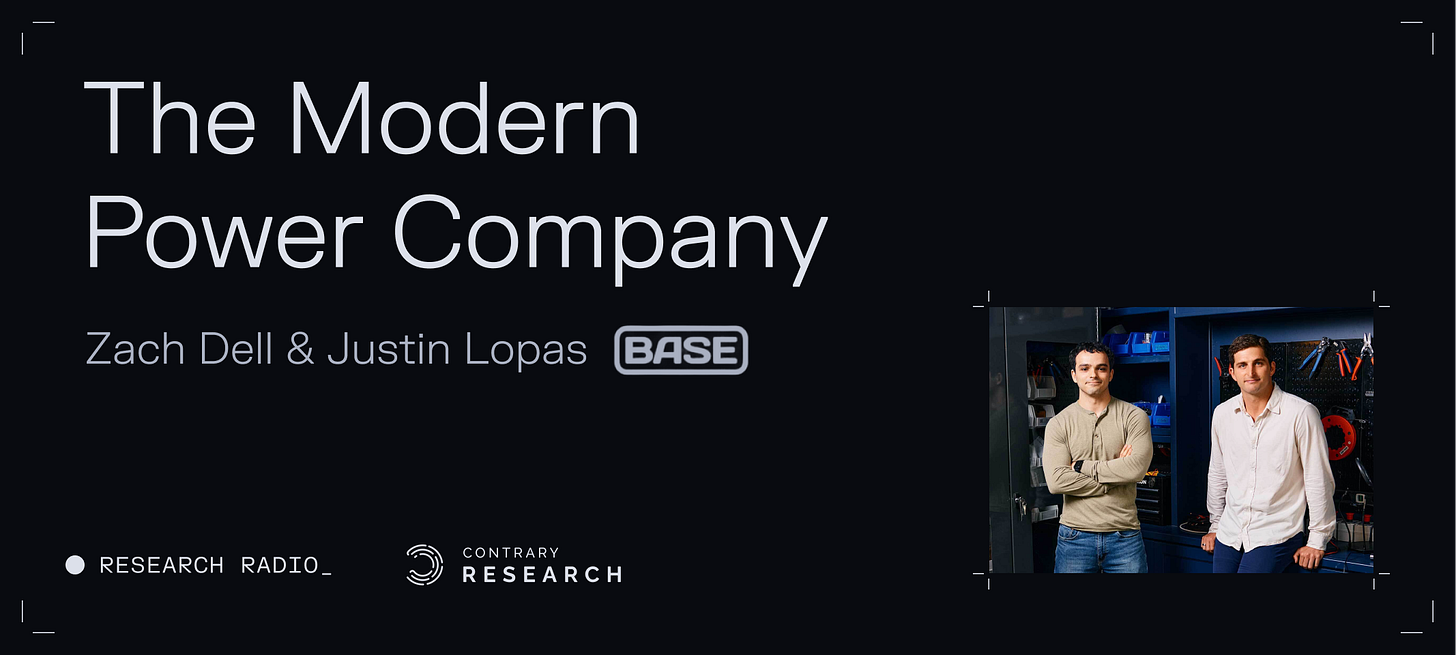Contrary Research Rundown #114
Amazon’s big AI push, plus new memos on TruckSmarter and Foundry.
Last week, we wrote about how the AI boom has led to an AI arms race between countries, but the arms race between big tech companies has been heating up as well.
Compute is one of the primary inputs into AI performance, both in training AI models and in AI inference. NVIDIA, which now has a $3.5 trillion market cap, has until recently had a virtual monopoly over supplying foundation model companies like OpenAI and Anthropic, or big tech companies developing competing models, with the necessary compute.
Some of the biggest tech companies — especially Microsoft (with its $14 billion investment in OpenAI), Amazon (which has invested a total of $8 billion in Anthropic), and Google — have been competing on AI CapEx, with NVIDIA benefiting from the competition as the principal provider of their GPUs. NVIDIA, which owns 95% of the AI chip market, has set benchmarks in AI training and inference through GPUs like the A100 and H100.
But things have lately taken a turn. This week, the Wall Street Journal reported that Amazon is building the biggest supercomputer in the world. At its annual re:Invent conference this past week, AWS unveiled Project Rainier, a supercomputer built on hundreds of thousands of its Trainium chips, which it claims will be one of the largest AI training clusters globally when it launches in 2025. Anthropic, an AI startup that received $4 billion in funding from Amazon last month, will use the supercomputer, which is five times larger by exaflops (a unit of measurement for supercomputing performance) than Anthropic’s existing training infrastructure.
Amazon is also claiming that early test results show its in-house AI chips are 30% to 40% cheaper than NVIDIA’s flagship H100 chips and is making a bid to convince AWS customers to use servers powered by Amazon’s own AI chip. Additionally, Amazon unveiled "Nova" foundation models for AI-powered text, image, and video generation, aiming to compete with OpenAI and Meta.
Last year, AWS debuted its Trainium2 chip and is now developing the Trainium3, expected to deliver four times the performance of Trainium2. By building its own chips and infrastructure, AWS aims to reduce dependency on NVIDIA GPUs and offer customers more cost-effective and scalable AI solutions. Other companies like Cerebras, Grok, and SambaNova Systems are also vying for a share of the market. Amazon’s cloud rivals like Microsoft and Google are also investing in developing their own AI chips.
Amazon is already seeing some traction: AWS announced this week that Apple is one of its newest chip customers, and companies like Databricks and Adobe (along with Anthropic) have reportedly seen promising results in their own recent tests of Amazon’s AI chips.
For most businesses, the choice between NVIDIA and Amazon for AI hardware isn’t a critical issue, according to analysts. Large companies are more focused on leveraging AI models for business value rather than the technical specifics of training them. This could work in Amazon’s favor, as it can integrate its Trainium chips through partnerships without customers needing to be aware of the underlying hardware. On the other hand, however, software developers are accustomed to writing software for NVIDIA’s chips.
It’s too early to say how it’ll all play out. But one thing is clear: while NVIDIA’s dominant market share has seemed unassailable to this point, the competitive landscape for AI hardware is starting to shift. Meanwhile, AWS is quietly becoming one of the biggest AI competitors by trying to be a one-stop shop for AI: users can deploy GenAI tools, build proprietary models, and now get compute directly from Amazon.
TruckSmarter offers a comprehensive platform that enables owner-operators to discover and book jobs through freight brokers, access nationwide load boards, and take advantage of integrated financial services, such as factoring, banking, and fuel discounts. To learn more, read our full memo here and check out some open roles below:
Senior Product Engineer (Fintech) - San Francisco, CA
Staff Product Designer - San Francisco, CA
Foundry provides compute on-demand, offering users access to NVIDIA’s most advanced GPUs, renowned for their exceptional performance in complex computational tasks. To learn more, read our full memo here and check out some open roles below:
AI Solutions Engineer - Palo Alto, CA
Senior Software Engineer (Full Stack) - Palo Alto, CA
Check out some standout roles from this week.
Gusto | Denver, Toronto, Los Angeles, San Francisco, New York or Remote (US) - Senior Data Scientist (Payments and Risk), Product Infrastructure Engineer, Senior Salesforce Developer, Senior Staff AI Software Engineer, Security Operations Analyst
Faire | San Francisco, CA - Senior Data Scientist, Senior Product Analytics Engineer, Lead Product Designer, Senior Staff Frontend Engineer, Senior Product Manager (Search Algorithms)
Linear | Remote (US) - Senior / Staff Mobile Engineer (iOS), Senior / Staff Product Engineer, Principal Product Designer, Senior / Staff Backend Engineer
Benchling | San Francisco, CA - Head of Product Marketing, Chief Accounting Officer, Strategic Account Executive
Elon Musk's attorneys have requested a preliminary injunction against OpenAI, some of its co-founders, and Microsoft, aiming to block them from engaging in alleged anticompetitive practices. The allegations include discouraging investment in OpenAI rivals, using "wrongfully obtained" competitive information via Microsoft, converting OpenAI to for-profit and transferring key assets, and conducting business with entities tied to defendants' “material financial interests”.
xAI has secured $5 billion in funding, boosting its valuation to $50 billion – more than double its value from its last round in May 2024. Investors include Qatar Investment Authority, Valor Equity Partners, Sequoia Capital, and Andreessen Horowitz. This brings xAI's total fundraising to $11.4 billion as of December 2024.
ByteDance, TikTok’s parent company, valued itself at $300 billion in a share buyback offer, which is one of the highest startup valuations ever. This brings the company’s valuation back to a similar level to where it had been valued in September 2022, up from late last year when the company’s valuation had reportedly dropped 26% to $223 billion.
Amazon announced updates to its AWS data centers to better support AI demand. The improvements focus on design simplification, power, cooling, and capacity. AWS emphasized streamlining electrical and mechanical designs to enhance reliability for customers.
SpaceX is reportedly negotiating a share sale valuing the company at $350 billion, up from $255 billion in November 2024 and $210 billion in June 2024. This would make it the world's most valuable private startup, eclipsing ByteDance’s $300 billion valuation.
OpenAI is partnering with defense-tech startup Anduril Industries to integrate its AI into systems used by the US military to counter drone attacks. This marks OpenAI's first collaboration with a weapons maker and its most significant involvement with the DoD. The deal highlights Silicon Valley's shift toward closer ties with the Pentagon, as OpenAI previously restricted military use of its AI. The technology will enhance Anduril’s counter-drone systems by improving detection and response, potentially helping reduce human risk.
OpenAI introduced ChatGPT Pro, a $200/month plan offering enhanced access to its top models and tools. It also updated its o1 system card which builds on previous safety efforts, focusing on robustness, red teaming, and safety improvements.
Shield AI is expanding its collaboration with Palantir Technologies to enhance command and control of autonomous systems, including in GPS and communications-denied environments. With Palantir’s Warp Speed manufacturing OS, the partnership aims to deliver scalable, AI-driven solutions to protect both military personnel and civilians.
Meta launched Llama 3.3, a new 70B model that matches the performance of the 405B model but is more cost-effective and easier to run. Using advanced post-training techniques like online preference optimization, it improves performance while reducing costs, making it more accessible to the open-source community.
A federal appeals court has unanimously upheld a law that could ban TikTok in the US unless it separates from Chinese ownership. The ruling comes seven months after TikTok sued the federal government, rejecting its claims that the law violates constitutional rights to free speech and individual liberty.
In last month’s episode of Research Radio, we sat down with Base Power Co-Founders Zach Dell (CEO) & Justin Lopas (COO). You can check out the full episode here.
At Contrary Research, we’re building the best starting place to understand private tech companies. We can't do it alone, nor would we want to. We focus on bringing together a variety of different perspectives.
That's why we're opening applications for our Research Fellowship. In the past, we've worked with software engineers, product managers, investors, and more. If you're interested in researching and writing about tech companies, apply here!












Another great post.